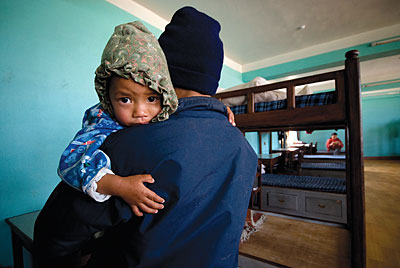 SAM KANG LI |
The Nepal Government suspended inter-country adoption in 2007 following evidence that Nepali 'orphanages' were selling children for thousands of dollars to foreign parents. Nepal then drafted new Terms and Conditions on adoption and once again opened shop for potential adoptive parents. Although the new policies were an improvement, they were still full of loopholes and did not prioritise the best interests of the child.
In April 2009, Nepal signed the 1993 Hague Inter-country Adoption Convention. A mission representing the Convention visited Nepal, concluded the 2008 Terms and Conditions were not adequate, and called for temporary suspension of inter-country adoptions from Nepal.
Forty-four Nepali orphanages have been accredited by the government to recommend children for adoption. The Investigation Monitoring and Recommendation Committee established by the Terms and Conditions receives files from orphanages. Its role is to verify the authenticity of each child's file, following which it can recommend the child to the Family Board, which matches the child with adoptive parents.
The committee should be independent, but in Nepal includes representatives from orphanages - a blatant conflict of interest.
In addition, it is bureaucrats, not social workers, who match children with adoptive parents. Investigations focus on whether the paperwork is genuine or not, whereas they should determine if the child has parents, and if local solutions can be found. In many cases the biological parents go from one place to another looking for their children, who may have already been adopted in Kathmandu by foreign parents.
One of the key reasons Nepal suspended inter-country adoption back in 2007 was because large amounts of money (sometimes up to US$20,000) were being paid by adoptive parents to facilitators and orphanages in Nepal. Some progress has been made in regulation, but financial gain is still at the heart of most inter-country adoption abuses.
Now, once a child is officially approved for adoption, foreign adoptive parents pay $5,000 to the orphanage, regardless of the time the child has stayed there, and another $3,000 to the Nepal Government. In addition, 79 international agencies pay $10,000 per year to be accredited by the Nepal Government, regardless of whether or not referrals are made. The authorities have not checked if these foreign adoption agencies are registered in their own countries according to the Hague criteria. This means foreign agencies that have been refused accreditation, are under investigation or have been cited for violations in their own countries are allowed to operate in Nepal.
A fund was established to oversee the money received from these foreign agencies and a management committee has been established under the Ministry of Women, Children and Social Welfare. The chairperson of the Child NGO Federation-Nepal, who basically represents Nepali orphanages, is a member secretary of this committee. But Bal Mandir and the Central Child Welfare Board are not represented.
It is clear the 2008 Terms and Conditions have failed. The German and Swedish embassies have stopped allowing adoptions under these rules. If Nepal is serious about ratifying the Hague Convention, it needs to start working on firm laws on national and international adoption. A temporary suspension will allow the government time to do so, as was done successfully in Guatemala and Cambodia. However, this suspension must not affect those adoptive parents who have been matched already.
Children without parents do not belong to orphanages. If they do not have anyone in their families they can live with it is the State's responsibility to assign appropriate guardians. There is a growing number of Nepali parents who want to adopt and can give children safe homes. Let us seriously develop foster families and in-country adoption. Only where this is not possible should we send a child abroad permanently.
READ ALSO:
Baby bajar On sale - FROM ISSUE #339 (09 MARCH 2007 - 15 MARCH 2007)
'Floodgates closed', - FROM ISSUE #387 (15 FEB 2008 - 21 FEB 2008)
'Abandoned,' - FROM ISSUE #417 (12 SEPT 2008 - 18 SEPT 2008)
Cinderella Children - FROM ISSUE #490 (19 FEB 2010 - 25 FEB 2010)


